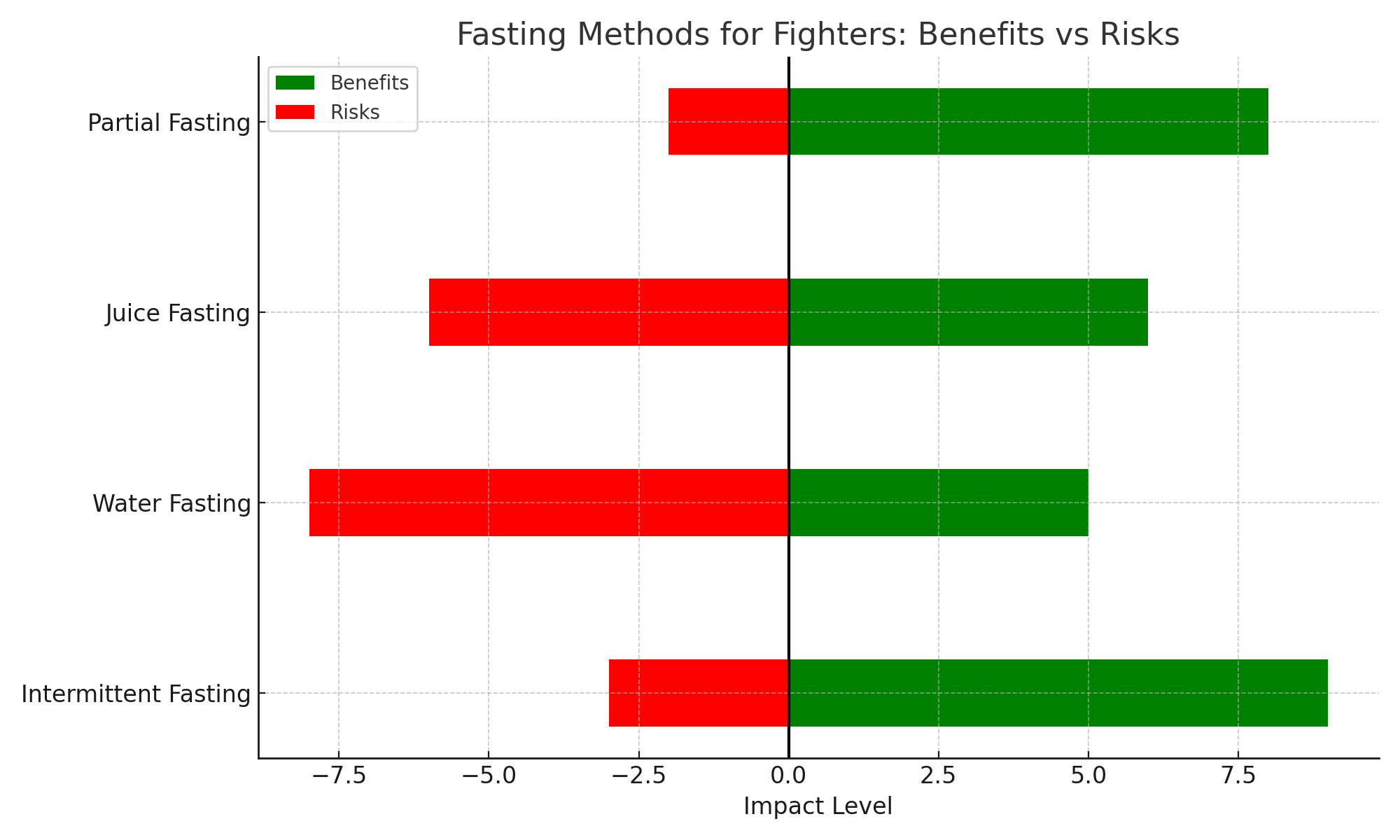
Fasting for Fighters: A Comprehensive Guide
Imagine your body as a finely tuned engine. Just as a car requires the right fuel and maintenance to perform optimally, your body needs proper nutrition and recovery strategies. Fasting, when implemented correctly, can be a powerful tool in a fighter's arsenal, potentially enhancing performance, aiding recovery, and improving overall health.
Fasting has been practiced for centuries for various reasons, including religious, cultural, and health purposes. In recent years, it has gained popularity among athletes seeking to optimize their performance and well-being. However, the effects of fasting can vary depending on the type, duration, and individual factors. This guide explores different fasting methods, their potential benefits and drawbacks for fighters and grapplers, and offers practical tips on integrating fasting into your training regimen.
Understanding Different Fasting Methods
There are several types of fasting, each with unique protocols and effects on the body. Let's delve into the most common methods and their relevance to combat sports athletes.
1. Intermittent Fasting (IF): Balancing Eating and Fasting Windows
Intermittent Fasting involves alternating periods of eating and fasting. Popular approaches include the 16/8 method (16 hours of fasting followed by an 8-hour eating window) and the 5:2 method (consuming a reduced calorie intake on two non-consecutive days per week).
Research suggests that IF can lead to weight loss, improved insulin sensitivity, and reduced inflammation. For fighters, these benefits may translate to better weight management and enhanced recovery. Notably, a systematic review concluded that IF provides benefits in terms of body composition without reducing physical performance.
"Intermittent fasting can be a valuable strategy for athletes to regulate fat and lean mass, positively impacting performance." — Conde-Pipó et al., Nutrients, 2024
2. Water Fasting: A Deeper Cleanse with Caution
Water fasting entails consuming only water for a set period, typically ranging from 24 to 72 hours. While some believe it offers benefits like enhanced autophagy and metabolic reset, it's crucial to approach this method with caution.
Studies indicate that prolonged water fasting may lead to rapid weight loss, primarily from water and glycogen depletion, and can result in muscle loss if not carefully managed. Additionally, risks such as dehydration and orthostatic hypotension have been reported.
"Water fasting creates significant calorie restriction, which results in rapid weight loss. However, it is not a sustainable practice and may result in rebound weight gain once ended." — Trista K. Best, M.P.H., R.D.
3. Juice Fasting: Nutrient Boost or Performance Hindrance?
Juice fasting involves consuming only fruit and vegetable juices for a designated period. While it provides vitamins and antioxidants, it often lacks essential macronutrients like protein and fats, which are vital for muscle repair and energy.
For athletes, this imbalance can lead to decreased energy levels and muscle loss. Experts caution that juice cleanses may not provide sufficient protein to meet the physiological demands of an athlete.
"Muscle maintenance takes work, including proper training and nutrition practices. Unfortunately, the majority of detox diets don’t have enough protein to support muscle growth, repair, and recovery." — Relentless Athletics
4. Partial Fasting: Selective Restriction for Sustainable Health
Partial fasting involves eliminating specific food groups, such as meat, dairy, sugar, or processed foods, for a certain period of time. Unlike complete fasting, this method allows athletes to maintain caloric intake while reducing inflammatory or hard-to-digest foods. It’s often easier to sustain and can improve digestion, reduce inflammation, and support long-term health goals.
For fighters and grapplers, partial fasting offers a way to reset the body without drastically limiting calories—making it ideal during active training phases.
Research shows that diets low in processed foods and high in plant-based options can significantly reduce markers of inflammation and improve cardiovascular health. ([Schmidt et al., Nutrients](https://www.ncbi.nlm.nih.gov/pmc/articles/PMC6520897/))
"What you cut out is just as important as what you put in. Partial fasting helps you stay sharp without sacrificing fuel." — Coach Elijah Morris, Strength & Performance Specialist
Visual Insight: Benefits vs Risks of Fasting for Fighters
To help you better understand which fasting method may suit your goals, here's a quick comparison of benefits and risks for fighters and grapplers:

FAQs on Fasting for Fighters
1. Can I train while fasting?
Yes, but it depends on the type of fasting and intensity of training. Lighter training during fasting is generally more sustainable, especially during water or juice fasts.
2. Will fasting make me lose muscle?
Extended or poorly planned fasts may lead to muscle loss. Ensure adequate protein intake and strength training to help preserve lean mass.
3. When is the best time to fast during my fight camp?
Fasting is best suited for off-season or deload weeks when intensity is lower and recovery is the priority.
Action Steps: How to Incorporate Fasting Safely
Start Here:
- Assess your goals—fat loss, recovery, or metabolic health—and choose a fasting method that aligns.
- Start with intermittent fasting like the 16/8 method for gradual adaptation.
- Track your training energy and performance while fasting; adjust as needed.
- Stay hydrated and consume nutrient-dense meals during eating windows.
- Consult with a coach or dietitian before attempting extended fasts.
- Avoid fasting during peak fight camp or heavy sparring phases.
- Listen to your body—fasting should enhance, not hinder, your performance.
Final Thoughts: Fuel Smart, Fight Hard
Fasting isn’t a one-size-fits-all strategy, but when timed and tailored correctly, it can be a powerful ally in your journey as a fighter. Whether you're shedding pounds, giving your gut a break, or recalibrating your energy systems—your approach to fasting should be as strategic as your training.
The real fight isn't just in the cage—it's in how well you prepare, recover, and adapt. Master your fuel, master your fight.




